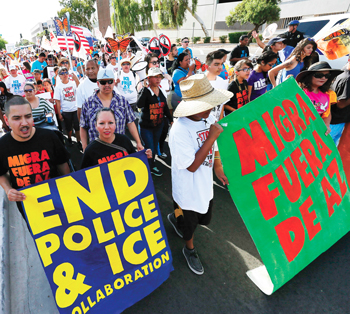Arizona racial profiling case to cost taxpayers $45 million
By Jacques Billeaud Associated Press | Last updated: May 29, 2015 - 10:17:54 AMWhat's your opinion on this article?

Protesters of U.S. Immigration and Customs Enforcement (ICE) agents working with Maricopa County Sheriff Joe Arpaio protest, April 23, as they block the intersection in front of the U.S. Federal Court in Phoenix. The protest was to remove ICE agents from county jails and was also in conjunction with the fi fth anniversary of Arizona’s SB1070 immigration bill.
|
Taxpayers are already on the hook for an estimated $45 million stemming from the racial-profiling lawsuit filed over Sheriff Arpaio’s signature immigration patrols—and the cost is expected to grow by millions more in the coming years as the county works to resolve the seven-year-old case.
The $45 million price tag consists of: $14.6 million spent over the last 18 months to carry out court-ordered changes at the agency; another $23.8 million budgeted over the next year to cover even more compliance costs; and $6.8 million in fees for lawyers on both sides.
Taxpayers are expected to face even more costs as Sheriff Arpaio’s office remains under the court’s supervision and the possibility looms for another racial-profiling trial that the county will have to fund.
County Supervisor Steve Gallardo, one of the officials who will ultimately vote on the county’s proposed budget, said the money being spent on the case could have been used for flood-control improvements, crime-lab upgrades and other unfunded projects.
“We have no idea what it’s going to cost the taxpayers,” said Mr. Gallardo, a critic of Sheriff Arpaio.
The sheriff’s office didn’t immediately respond to an interview request May 19.
Tom Morrissey, a retired chief U.S. marshal and a longtime Arpaio friend, said he couldn’t speak about the costs on the sheriff’s behalf, but he said lawsuits are inevitable for police officials who take a robust approach to law enforcement. “If you aren’t getting sued, you aren’t doing your job,’’ Mr. Morrissey said.
The sheriff took on immigration enforcement a decade ago as voter frustrations mounted over the state’s porous border with Mexico, and his efforts brought him popularity among voters and campaign contributions from across the country. His tactics turned into a legal and financial liability after a group of Hispanics brought a class-action lawsuit saying that Sheriff Arpaio’s office had singled out Latinos in its patrols.
U.S. District Judge Murray Snow two years ago concluded that Sheriff Arpaio’s officers had systematically racially profiled Latinos in regular traffic and immigration patrols, ushering in a series of court-ordered changes that are proving costly to taxpayers.
That includes buying body cameras for hundreds of deputies, setting up a computerized system aimed at detecting misconduct by officers and conducting more training to ensure officers aren’t making unconstitutional traffic stops. Taxpayers also are picking up the tab for a team of retired police officials to monitor Sheriff Arpaio’s office on behalf of the judge.
The costs from the profiling case come directly out of the county’s budget, and not from the sheriff himself. County officials say they don’t believe Sheriff Arpaio has had to pay any legal fees, settlements and judgments related to his work in his 22 years as sheriff. The sheriff did offer to pay $100,000 from his own pocket in an unsuccessful bid to short-circuit contempt-of-court hearings against him in the case.
The county also is on the hook for an additional $74 million related to Sheriff Arpaio that is separate from the racial-profiling costs. That figure includes judgments, settlements and legal fees for the sheriff’s office during Mr. Arpaio’s tenure, covering things like lawsuits over deaths in his jails and the lawman’s failed investigations of political enemies.
The costs were paid for through a county fund dedicated to covering legal costs.
It’s not known how long the legal costs will drag on.
Judge Snow has signaled that he may hold a second trial in the profiling case stemming from Sheriff Arpaio’s acknowledged defiance of a court order that he quit his immigration patrols. Lawyers who won the profiling case said hundreds of Latinos have been identified as having been pulled over by deputies after the order was issued and should be financially compensated by the county for the harm they suffered.
And the efforts to comply with the judge’s orders will take several years. Judge Snow recently also said the sheriff’s office is 29 percent in compliance. Once the sheriff’s office is fully compliant, it must remain so for three straight years before it can be released from the court’s oversight. Taxpayers will pick up the compliance costs.
All the while, the county is in the midst of defending a civil rights lawsuit brought by the U.S. Justice Department that alleges retaliation against Sheriff Arpaio’s political rivals and racial profiling. The county has pulled $4.7 million out of its budget so far to defend that case.
INSIDE STORIES AND REVIEWS
-
-
About Harriett ... and the Negro Hollywood Road Show
By Rabiah Muhammad, Guest Columnist » Full Story -
Skepticism greets Jay-Z, NFL talk of inspiring change
By Bryan 18X Crawford and Richard B. Muhammad The Final Call Newspaper @TheFinalCall » Full Story -
The painful problem of Black girls and suicide
By Charlene Muhammad -National Correspondent- » Full Story -
Exploitation of Innocence - Report: Perceptions, policies hurting Black girls
By Charlene Muhammad -National Correspondent- » Full Story -
Big Ballin: Big ideas fuel a father’s Big Baller Brand and brash business sense
By Bryan Crawford -Contributing Writer- » Full Story






 Click Here Stay Connected!
Click Here Stay Connected!








